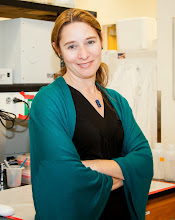Let’s leave speaking aside for a moment (or several long
moments, considering I haven’t posted anything for months!) and instead dip
into the written word. In science, our success depends on our writing,
generally in the form of scientific papers that serve as the currency of our
world. Often those papers are formulaic: the introduction says how the
topic/question at hand isn’t fully understood, the methods expound in (often)
boring, third-person detail what we did and how we did it, the results tick off
our hypotheses as each is upheld (like we really know what would happen!), and
the discussion tells people how brilliantly we’ve added to our field by finding
something novel. Always “novel”…”new”
just isn’t new enough. Someone once sent
me a great tongue-in-cheek article about how to write a formulaic paper (like
scientific Mad-Libs)-anyone out there in cyberspace have a copy?
A new book challenges the assertion that academic writing
must be jargon-y and archaic. Stylish
Academic Writing by Helen Sword showcases examples of bland, traditional
academic prose and contrasts them with vivid, exciting writing from a variety
of disciplines. I just ordered my
copy-has anyone read it yet? What did
you think?
Whether you plan to read her book or not, I think it
highlights a divide in scientific writing: do we write to sound smart, or to
engage? Can we do both in a single piece? How? And how do we change the culture
of academic writing so it’s encouraged to both inform and entertain?

I think this is a great idea to begin trying to create scientific writing in an engaging way. I'm currently writing my Master's thesis and am struggling with the formulaic writing process that should be so easy in theory but it so painful in process. I pine for the creative writing process again.
ReplyDeleteIf the push continues for more open source journals there also needs to be a corresponding push for more readable science articles. There will always be a place for technical papers and jargon for specific fields, but if a scientist wants to be more widely read and have greater impact then they should be able to publish in a more creative and engaging way. Open source journals are great but transparency of information doesn't necessarily into knowledge when it's slathered in jargon.